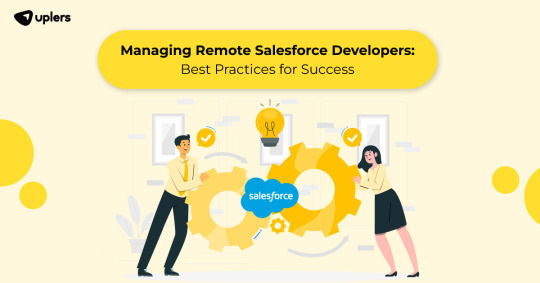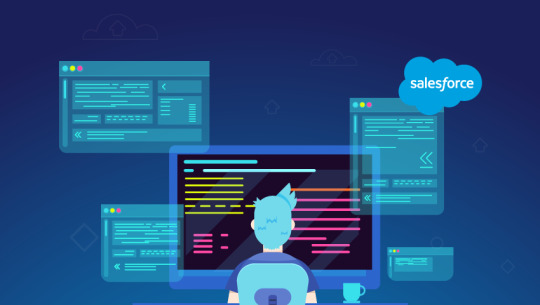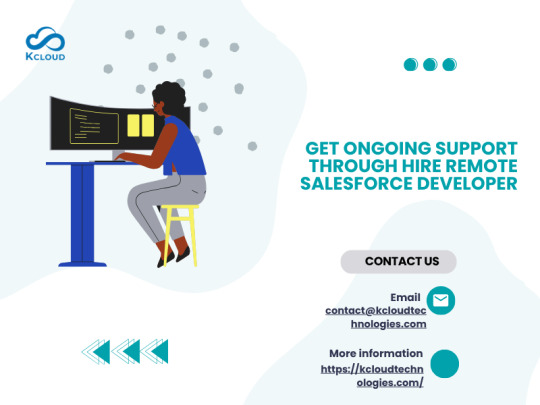#hire remote salesforce developer
Explore tagged Tumblr posts
Text
Hire Salesforce Developers for Tailored Solutions
Hire a Salesforce Developer to enhance your business processes and streamline CRM functionalities. Leverage certified expertise to customize Salesforce solutions, integrate systems, and optimize workflows. With a focus on scalability and innovation, professional Hire Salesforce developers deliver efficient, results-driven outcomes tailored to your unique business requirements. Maximize ROI with expert development services designed for seamless Salesforce implementation and support.
#hire salesforce developers#hire salesforce developer#hire dedicated salesforce developer#hire remote salesforce developer#salesforce developers for hire#hire salesforce programmer#hire salesforce consultant#hire salesforce admin#hire salesforce expert#certified salesforce professional
0 notes
Text
Managing Remote Salesforce Developers: Best Practices for Success

To effectively manage a team of remote Salesforce developers requires more than just the right team. As the global acceptance for remote hiring is proliferating, the demand to hire remote Salesforce developers is on a rise. You must have the right hiring approach in place to ensure that remote teams can operate just as effectively as the in-office teams.
Let���s delve into the key strategies that you must employ to ensure your remote Salesforce team is productive and aligned with your business goals.
Ensuring Success with Remote Salesforce Developers: Key Strategies to Follow
Define clear goals and KPIs
It's critical to establish precise objectives and key performance indicators (KPIs) when hiring remote Salesforce engineers. These metrics ought to be in line with your overarching business goals and serve as a guide for your developers. You can more accurately gauge your progress and output by clearly stating these objectives. Additionally, this keeps remote engineers motivated and engaged by assisting them in seeing how their work fits into the larger picture.
Regular feedback and support
When hiring remote Salesforce developers, another best practice is to give regular feedback and support. Regular feedback assists in improving their work, coordinating their efforts with your company's objectives, and raising employee morale.
Furthermore, providing assistance, in the form of extra training or materials, guarantees that your developers have all they require to succeed. To keep them motivated, it's also helpful to acknowledge and praise their accomplishments.
Clear communication channels
A vital component of overseeing distant Salesforce developers is creating clear and regular lines of communication. Whether weekly or daily, regular check-ins can help guarantee that everyone is in agreement. By bridging the physical barrier with applications like Slack, Microsoft Teams, or Zoom, your team can work together more successfully. To prevent misconceptions, it's critical to establish early expectations regarding the frequency and preferred routes of communication.
Foster a collaborative work environment
In order to succeed, even with distant Salesforce engineers, you must create a collaborative environment. Encourage the members of your team to ask questions, discuss ideas, and work together on projects. Regular team meetings, brainstorming sessions, or collaboration tools like Salesforce's cloud-based solutions can help achieve this. Fostering an atmosphere where developers are at ease to exchange ideas might result in creative solutions and enhanced project outcomes.
Leverage time zone differences
Make the most of it if you hire Salesforce engineers remotely who live in different time zones. Due to time zone disparities, your team may be able to work nonstop, hence expanding your operating hours. To effectively handle these differences, team members must plan meetings at times that work for everyone and make sure that responsibilities are distributed amongst them when they are dispersed in various time zones.
Conclusion
By employing these practices you can ensure that your remote team is productive, engaged, and future-proof ready. Don’t wonder why to hire salesforce developers remotely and how to hire remotely. Expand your team with access to a global talent network and witness the magic of remote Salesforce developers unfold.
0 notes
Text
Remote Salesforce Development: Best Practices for Hiring and Managing Remote Salesforce Developers

Introduction
The tech industry landscape is rapidly transforming with the rise of remote work, a trend that has become particularly prominent in niche sectors like Salesforce development. This shift presents unique challenges and opportunities in the realms of hiring and managing remote professionals. Organizations looking to leverage the benefits of remote Salesforce teams must adopt effective strategies tailored to this new work paradigm. This article delves into the best practices for hiring, onboarding, and managing remote Salesforce developers, highlighting the importance of these processes in the success of remote teams.
I. The Hiring Process
Identifying the Right Talent
The quest for the ideal Salesforce developer begins with a clear understanding of the required skills and experience. Look beyond basic programming knowledge; proficiency in Salesforce’s suite of tools, experience with customizing CRM solutions, and familiarity with cloud-based technologies are equally important. Platforms like LinkedIn, Upwork, and Salesforce communities offer a rich pool of global talent. Networking in industry events, both virtual and physical, can also uncover potential candidates.
Evaluating Candidates
Evaluating candidates remotely requires a blend of technical and interpersonal assessments. Technical evaluations should include practical coding tests and problem-solving scenarios specific to Salesforce. During remote interviews, focus on communication skills and cultural fit. How a candidate interacts in a remote setting gives insight into their potential as a team member. It is crucial to identify the right candidate based on their skills, your business requirements, and their ability to match those particular requirements.
Leveraging Salesforce Certifications
Salesforce certifications are vital indicators of a candidate’s expertise and commitment to professional development. Understanding the various levels of Salesforce certifications—from Certified Administrator to Certified Technical Architect—helps identify candidates who meet your projects’ specific needs.
II. Effective Onboarding Strategies
Creating a Welcoming Remote Environment
A structured onboarding process is vital for integrating remote employees. Use digital tools like video introductions, virtual tours of the company, and digital handbooks to familiarize new hires with the company culture and processes. They will only be able to deliver the best results if they get all their required information and help during the onboarding.
Resources
Ensure new hires have access to necessary company materials, processes, and such. It helps to have a buddy in each department for the Salesforce developer to get department-specific feedback while building tools for them.
Setting Clear Expectations
Clearly communicate roles, responsibilities, and project goals from the start. Establishing clear expectations helps remote Salesforce developers understand their contribution and align their efforts with the company’s objectives. They also need to be given a background of their assigned project so they know how they are supposed to participate and all that has already been taken care of.
III. Managing Remote Salesforce Developers
Communication Best Practices
Frequent communication is key in a remote setting. Establish regular check-ins and encourage open dialogue. All stakeholders need to be kept updated on the Salesforce development process, so consistent communication is key. Apart from general updates, getting feedback from them is helpful to learn how the company adapts to the new processes and tools.
Project Management Tools and Techniques
Effective project management in remote teams requires robust tools and methodologies. Adopting Agile methodologies can enhance flexibility and collaboration, adapting well to the remote work environment. It also helps to work in sprints with a constant feedback cycle to improve iteratively.
Building Collaboratively
A tool that is to be deployed company-wide needs to be built with the cooperation and collaboration of the entire organization. Ensure the remote Salesforce developer has access to each department’s workflow and the company’s overall workflow so they can build a solution that benefits all stakeholders. The department also needs to be trained on each module built to encourage a seamless company-wide adoption of the new Salesforce tools.
Monitoring and Feedback
Monitor the development process and build an internal team of adoption testing to see any feedback that can come with the actual use of the tool. With this feedback, you can work on all the kinks in the tool, as well as processes and adoption. The internal testing committee can be made of a member of each department so that all are covered, and no particular workflow is neglected.
IV. Overcoming Challenges in Remote Salesforce Development
Dealing with Time Zone Differences
Managing time zone differences is crucial for maintaining efficiency. Implement flexible working hours and plan meetings during overlapping work times to ensure effective collaboration. Certain remote Salesforce developers also provide time zone-free working hours so you can hire them to work in your time zone as best as possible. You can set the work day exactly as your company’s or even simply have a few overlapping hours for real-time communication and updates.
Ensuring Security and Compliance
In a remote setting, maintaining data security and compliance is paramount. Implement strong security protocols, including VPNs, secure logins, and adherence to data protection laws.
V. Case Studies/Success Stories
Incorporate case studies or success stories from companies that have successfully navigated the challenges of remote Salesforce development. These examples provide practical insights and demonstrate the effectiveness of the strategies discussed.
Conclusion
Adopting these best practices in hiring, onboarding, and managing remote Salesforce developers is essential for the success of remote teams. This approach not only addresses the unique challenges of remote work but also harnesses its full potential. With CRMJetty’s experience of over 16 years as a company and with our Salesforce developers who have experience working in the remote setting, you can rest assured that your project will be taken care of in the best possible way.
Please reach out to us for all your Salesforce development needs, and we can discuss your requirements to help you with the best solutions.
Original Blog: https://www.crmjetty.com/blog/remote-salesforce-development-best-practices-hiring-managing-remote-salesforce-developers/
0 notes
Text
How Salesforce Developers Shape the Future of Project Management Success?
The ever-changing field of project management has made technology developments crucial to the achievement of desired results. With the help of knowledgeable developers and consultants, Salesforce is a platform that can truly alter businesses, even in the face of an extensive number of competing offerings.
A Salesforce consultant will have a huge influence on how project managers succeed in the future. They will use Salesforce's features to improve teamwork, accelerate efficiency, and streamline procedures.
In this blog, we'll reveal the critical role that Salesforce developers play in influencing the success of project management. We'll explore their experience streamlining processes, streamlining work, and customizing solutions to drive productivity and cooperation in the fast-paced project environments of today.
Customized Solutions Crafting
Explore the ways in which developers modify modules, improve user experience, and guarantee scalability to ensure future-proofing of Salesforce systems.
Adapting Salesforce Modules:
The modules in Salesforce's suite are easily navigated by developers, who may easily customize features to fit project workflows. Whether creating complex workflows, setting unique items, or connecting third-party apps, developers take use of Salesforce's adaptability to create solutions that align with project goals.
User Experience Enhancement:
Developers may simply explore the modules in Salesforce's suite and modify functionalities to suit project procedures. Whether establishing custom items, integrating third-party apps, or building intricate workflows, developers leverage Salesforce's flexibility to build solutions that support project objectives
Scalability and Future-Proofing:
Future-focused, scalable, and flexible solutions are designed by developers. They future-proof project management systems by foreseeing possible expansion and changing needs, providing the groundwork for long-term success and adaptability.

Seamless Collaboration Integration
Examine how seamless collaboration integration may strengthen teamwork, bridge systems, and enable data-driven decision-making.
System Integration:
By utilizing middleware and APIs, developers can plan the smooth connection of Salesforce with other vital programs and systems. Integration facilitates data flow and guarantees a cohesive environment through connections with project management software, communication tools, and enterprise resource planning (ERP) systems.
Collaborative Workspace:
Within Salesforce, developers create collaborative workspaces that enable teams to share insights, interact in real time, and centralize communication. Transparent communication and knowledge sharing are facilitated by features like Chatter, Communities, and interfaces with Slack and other collaborative applications.
Data-Driven Decision Synthesis:
Developers facilitate the extraction of meaningful insights from heterogeneous data sources for project stakeholders by providing integrated analytics and reporting functionalities. Through the synthesis of data in Salesforce, ranging from project status to customer feedback, stakeholders can efficiently minimize risks, make well-informed decisions, and drive strategic objectives.
Automation for Enhanced Efficiency
Investigating data synthesis, collaborative workspaces, and efficient procedures for well-informed decision-making.
Workflow Automation:
Developers use Salesforce's automation features, such Flow and Process Builder, to standardize procedures and automate time-consuming tasks. They manage workflows that reduce human error, speed up task completion, and increase overall efficiency by specifying triggers, actions, and approval processes.
AI-Powered Insights:
By using artificial intelligence (AI) tools such as Salesforce Einstein, developers are able to introduce intelligence into project management procedures. AI-driven insights enable project teams to make data-driven decisions quickly, from sentiment analysis that measures stakeholder satisfaction to predictive analytics that predicts project timeframes.

Mobile Optimization:
Salesforce is optimized for mobile devices by developers who understand how important mobility is in today's dynamic work environment. They ensure that project stakeholders can access vital information and complete activities while on the go by utilizing native app development and responsive design, which promotes responsiveness and productivity.
Conclusion
In conclusion, Salesforce developers are the engine of innovation, using the platform's potential to entirely rethink the project management sector in conjunction with Salesforce consulting experience. By means of customization, automation, and integration, they facilitate enterprises in achieving unparalleled levels of efficiency, collaboration, and success. The combined experience of consultants and Salesforce developers will be essential in steering project management's future course toward even higher success and quality as it develops.
FAQs About Salesforce Developers and Project Management
How do Salesforce developers contribute to project management success?
Salesforce developers streamline project workflows, automate tasks, and customize solutions, enhancing efficiency and collaboration for project teams.
What skills do Salesforce developers bring to project management?
Salesforce developers possess expertise in coding, data management, and platform customization, enabling them to tailor solutions that align with project goals and requirements.
Why is Salesforce considered crucial for future project management?
Salesforce's robust platform offers scalable solutions, real-time insights, and seamless integration capabilities, empowering project managers to drive innovation and achieve project success efficient
#remote work#technology#hire salesforce developer#hire salesforce consultant#project manager#tech jobs#Future of businesses
4 notes
·
View notes
Text

Hiring a remote Salesforce developer ensures you receive ongoing support to keep your CRM environment running smoothly and efficiently. These experts offer continuous monitoring, timely troubleshooting, and proactive enhancements tailored to your business needs. With flexible availability and a global talent pool, remote developers provide cost-effective support without compromising quality. They provide regular updates, bug fixes, and system optimizations to ensure optimal performance. Whether it's customizing features, integrating third-party apps, or maintaining data integrity, remote Salesforce developers deliver consistent, reliable support. With Hire Remote Salesforce Developers, This ongoing partnership helps businesses stay agile, scalable, and aligned with evolving customer and market demands.
0 notes
Text
Hire Salesforce Developers - Starting from $15/hour
Hire smarter with HireDeveloper.Dev, your gateway to the top 3.5% talents in Salesforce development. Whether you're scaling or optimizing your CRM, you can hire in 48 hours and keep costs in check. Fast-track your growth with developers who get it right the first time. Hire Now, Visit: https://hiredeveloper.dev/hire-expert-salesforce-developers
#hire developer#hire remote developer#hire dedicated developer#find a developer#hire salesforce developers#salesforce certified developers
0 notes
Text
Hire Best Remote Salesforce Developers
Imagine a CRM that is more than just a data repository—rather, a multifaceted beast capable of task automation, customer experience personalization and departmental sales growth. You know as a tech leader that the power of a fully optimized Salesforce is the key to unlocking explosive growth. The problem lies in the fact that your present workforce is overworked and that traditional hiring is a talent-starved, lengthy process. Plus, it’s more costly for many enterprises and startups running on a tight budget. This is where Muoro gets all the attention.
#Hire Best Remote Salesforce Developers#Hire Remote Salesforce Developers#Hire Salesforce Developers
0 notes
Text
Hire Remote Salesforce Developers
Hire Remote Salesforce Developers to propel your business to new heights. Our team of experienced professionals specializes in Salesforce development, customization, and maintenance, providing tailored solutions to meet your unique business needs. With seamless integration and optimization, we ensure your Salesforce platform operates at peak performance, driving efficiency and maximizing ROI. Trust our remote developers to deliver exceptional results, no matter where you are located.
#Best Hire Remote Salesforce Developers#Top Hire Remote Salesforce Developers#Hire Remote Salesforce Developers
0 notes
Text
Summer 2025 Game Development Student Internship Roundup, Part 1
Internship recruiting season has begun for some large game publishers and developers. This means that a number of internship opportunities for summer 2025 have been posted and will be collecting applicants. Internships are a great way to earn some experience in a professional environment and to get mentorship from those of us in the trenches. If you're a student and you have an interest in game development as a career, you should absolutely look into these.
If you know of any game development internships that aren't listed here, please tell me! I'll try to collect another batch when EA posts theirs as a follow-up.

Technical Artist Intern (Remote!)
Sound Design Intern (Remote!)

Game Design Intern
Game Engineering Intern
Data Analytics & Data Science Intern
Localization Production Intern
Environment Art Intern
Animation Intern
VFX Intern
3D Character Art Intern
Site Reliability Engineering Intern

Concept Artist Intern (Canada)
Animation Intern
VFX Intern
Game Engineering Intern
Technical Artist Intern
Threat Intelligence Analyst Intern
UI/UX Design Intern
User Research Intern
Computer Graphics Intern
Software Engineering Intern
Production & Project Management Intern
Concept Artist Intern (California)

World Designer Intern

3D Artist Intern
Animation Programmer Intern
Animation Technical Design Intern
Audio Design Intern
Backend Engineer Intern
Balance Design Intern
Character Artist Intern
Engine Programmer Intern
Environment Art Intern
Game Design Intern
Game Security Intern
Gameplay Programmer Intern
Gameplay Systems Engineer Intern
Salesforce Developer Intern
Software Engineer Intern
Environment Art Intern
Game Design Intern
Gameplay Programmer Intern
Tools Programmer Intern
Technical Artist Intern
Technical Character Animation Intern
Technology App Portfolio Intern
Tools Programmer Intern

Concept Artist Intern
At time of writing, Electronic Arts was performing maintenance on their recruiting site and should have new openings posted on November 12th 2024. I'll do a second round of internship opportunities once they post, along with Ubisoft and any others I missed.
Brush up your resume and focus on any game dev work you've done. Amateur game dev work counts! Tabletop game mastering counts! Amateur board and card game design counts! Making your own CCG fan sets or draft cube counts! Game jam work counts! These make a bigger difference when it comes to hiring than most other kinds of work experience.
If you need assistance with your resume/CV, cover letter, or have other questions, join our discord and ask. The server is full of experienced developers who can help review your materials and give you suggestions. I also suggest taking a look at my Game Career FAQ. There's a lot of answers in there already. Best of luck out there.
[Join us on Discord] and/or [Support us on Patreon]
Got a burning question you want answered?
Short questions: Ask a Game Dev on Twitter
Long questions: Ask a Game Dev on Tumblr
Frequent Questions: The FAQ
28 notes
·
View notes
Text
Top Reasons to Learn Salesforce in 2025
In today’s digital-driven world, businesses need tools that can help them manage customers, streamline operations, and boost profits. Salesforce certification course, the world’s number one Customer Relationship Management (CRM) platform, has become an essential tool for organizations of all sizes. As companies increasingly depend on Salesforce, the demand for skilled professionals in this field is skyrocketing. If you are considering a career in technology or business operations, now is the perfect time to learn Salesforce.
What Makes Salesforce So Popular?
Salesforce has transformed the way businesses handle customer relationships. It offers an all-in-one cloud platform that manages sales, service, marketing, and analytics seamlessly. Its customizable features and integrations make it suitable for various industries like healthcare, finance, manufacturing, retail, and education.

Here are the main reasons Salesforce is so widely adopted:
Cloud-Based Solution: As a cloud platform, Salesforce enables remote access to data and services, helping teams work from anywhere at any time.
Highly Customizable: Businesses can personalize Salesforce to match their specific needs without heavy coding or technical skills.
Excellent Data Management: Salesforce helps companies store, analyze, and utilize customer data to provide better services and increase sales.
Scalable for All Business Sizes: From small businesses to large enterprises, Salesforce fits every organization thanks to its flexible design and feature sets.
Why Should You Learn Salesforce?
Massive Career Opportunities Salesforce skills are in high demand globally. Companies across industries are hiring certified Salesforce Administrators, Developers, Consultants, and Architects to optimize their CRM systems.
High-Paying Jobs Salesforce-certified professionals earn competitive salaries. According to recent surveys, Salesforce Developers and Consultants are among the top earners in the tech field.
Diverse Roles Available Learning Salesforce opens doors to multiple roles like:
Salesforce Administrator
Salesforce Developer
Salesforce Consultant
Salesforce Business Analyst
No Technical Background Required Anyone can start learning Salesforce—even those without a programming background. Basic certifications like the Salesforce Administrator certification are designed for beginners.
Continuous Innovation Salesforce constantly evolves with new features and updates, ensuring you stay ahead in the tech world.
Benefits of Salesforce Certification
Getting Salesforce certified proves your expertise to employers. Certifications such as Salesforce Certified Administrator, Platform Developer, and Marketing Cloud Consultant can boost your resume and open more job opportunities.
These certifications provide:
Professional recognition
Increased job prospects
Higher salary potential
Greater confidence in handling CRM projects

Industries Using Salesforce
Salesforce is not limited to the IT sector. Other industries using Salesforce include:
Banking & Finance
Healthcare
E-commerce
Education
Government Services
This means Salesforce professionals have job options in diverse sectors worldwide.
Conclusion
Learning Salesforce in 2025 is an excellent career investment. Whether you want to enhance your current job skills or transition into a tech-driven role, Salesforce offers limitless possibilities. With its growing demand, attractive salary packages, and versatility across industries, Salesforce skills will keep you in high demand for years to come.
Start your journey with a Salesforce Certification Course today and unlock a world of career opportunities!
0 notes
Text
Master Salesforce Admin & Developer Skills with LWC: A Live Project Learning Experience

In today’s job market, Salesforce skills are not just a bonus—they're essential. Whether you’re a complete beginner or someone already working in tech, learning Salesforce opens the door to high-paying careers and exciting growth opportunities. But with so many online options, what makes a course truly effective?
If you're looking to learn Salesforce (Admin + Developer) with LWC Live Project, you want a learning experience that’s practical, industry-relevant, and future-ready. And that’s exactly what this course on Korshub delivers.
Let’s dive into why this course deserves your attention and how it can launch or elevate your Salesforce career.
Why Learning Salesforce Is a Smart Move in 2025
Salesforce dominates the global CRM market, used by over 150,000 companies—including Fortune 500s like Amazon, Google, and Coca-Cola. It powers sales, marketing, service, and analytics across multiple industries.
Here’s why Salesforce skills are in demand:
💼 Over 9 million new Salesforce-related jobs are projected by 2026
💸 Average salary for Salesforce Admins: $80K–$120K/year
🌍 Work-from-anywhere flexibility—Salesforce roles are perfect for remote careers
📈 Constant growth—Salesforce keeps adding new tools and features like Lightning Web Components (LWC), AI-powered automation, and DevOps integration
But knowledge isn’t enough. Employers are looking for real project experience. That’s where a Live Project course stands out.
What Makes This Salesforce Admin + Developer Course Unique?
Most courses will teach you theory. This one goes far beyond.
This is a complete learning journey where you will:
✔ Understand Salesforce fundamentals (Admin)
✔ Build custom apps using Apex, Visualforce, and Lightning Web Components (LWC)
✔ Work on a live project that mimics real-world business requirements
✔ Learn deployment, automation, and best practices
✔ Walk away with a portfolio-ready Salesforce project
Sounds exciting? Let’s break it down further.
1. Admin + Developer: Two Skill Sets, One Power Package
This course helps you become both an Administrator and a Developer, which means:
You learn to manage users, security, and workflows like a pro Admin
You master Apex programming, LWC components, triggers, and API integrations as a Developer
Being a hybrid talent gives you a serious competitive edge. Companies love hiring professionals who can do both.
2. Hands-On with Lightning Web Components (LWC)
LWC is the future of Salesforce development.
In this course, you’ll learn:
How to build and deploy LWCs
Real-world scenarios using LWC to build UI/UX-rich components
Integrating LWC with Apex and backend logic
Dynamic forms, event handling, and advanced inter-component communication
Even seasoned Salesforce pros are now upskilling in LWC. You’ll already be ahead of the curve.
3. The Live Project Advantage
Reading documentation and watching videos is one thing. Solving real-world problems is another.
The live project in this course simulates actual client requirements—just like in a real job. You’ll build a functional Salesforce application from the ground up:
Understand client requirements
Map them into Salesforce modules
Create custom objects, validation rules, automation, and flows
Write Apex classes, triggers, test classes
Build reusable LWCs to improve UI
This experience helps you confidently answer job interview questions and showcase practical experience.
4. Learn at Your Own Pace—But Never Alone
Even though this is a self-paced course, you're not left on your own.
✅ Active Q&A support
✅ Community for doubt-clearing
✅ Step-by-step guidance and walkthroughs
✅ Real instructor feedback for your project work
Whether you’re learning nights, weekends, or full-time, you’ll have support along the way.
5. From Resume to Real World: Career-Ready Skills
At the end of the course, you’ll be able to:
Set up and manage a Salesforce org
Create advanced automation using Flow Builder
Write scalable, reusable Apex code
Build LWC-based UI components
Deploy code between sandbox and production
Handle real-time errors and debugging like a professional
Deliver an end-to-end Salesforce project
These are the exact skills companies screen for in interviews—and the kind that get you job-ready.
Who Is This Course Perfect For?
This isn’t just for developers or admins. It’s ideal for:
👨💻 Beginners with zero Salesforce experience
👩🎓 Students looking to add practical skills to their resume
💼 Working professionals transitioning into tech
🔄 Manual testers or business analysts moving to Salesforce automation
🔝 Experienced Admins upgrading to Developer or LWC roles
If you're someone who believes in learning by doing, this course is your best bet.
How This Course Helps You Ace Salesforce Interviews
Real interviews often revolve around scenario-based questions, like:
"How would you handle a custom validation error during record update?"
"Can you explain how to handle component communication in LWC?"
"Walk me through the deployment process from sandbox to production."
You’ll learn how to confidently answer these—and more—because you’ve actually done it during the live project.
Also included are:
📄 Interview prep tips 📄 Sample questions 📄 Resume-building techniques 📄 Certification guidance
Built for 2025 and Beyond
Salesforce continues to evolve—and this course is future-focused.
It doesn’t just teach what Salesforce used to be; it equips you for what it is becoming:
AI-enabled tools (Einstein)
DevOps Center
LWC updates
Salesforce mobile development
Industry cloud integrations
This keeps your skills relevant for the long run.
No More Info Overload – Just What You Need
With so many learning platforms, it’s easy to feel overwhelmed. This course cuts the fluff and delivers focused, clear lessons in small, digestible chunks.
🎯 Direct-to-the-point explanations
📺 Engaging video lectures
🧠 Quizzes to reinforce concepts
💡 Code-along examples
📁 GitHub project access
All designed to help you actually learn—not just watch videos and forget.
Certification-Ready Training
Want to get Salesforce certified? This course lays the foundation for:
Salesforce Certified Administrator
Salesforce Platform Developer I
Salesforce Associate
You’ll gain a deep understanding of the topics covered in these certifications—plus the confidence that comes with hands-on experience.
What Past Learners Are Saying
“The live project part was a game changer. I could finally apply everything I learned.” — Priya S., now a Salesforce Admin in Bangalore
“The LWC tutorials were amazing. I finally understood how to build reusable components!” — Ahmed R., Salesforce Developer in Dubai
“I cracked two job interviews with the knowledge I got from this course.” — Neha T., switched careers from Testing to Salesforce
Why Choose This Salesforce Course via Korshub?
Korshub curates only high-value, proven courses. So when you learn Salesforce (Admin + Developer) with LWC Live Project, you’re not just clicking ‘Enroll’—you’re investing in your career.
🚀 Curated content that works 💻 Real projects, not just theory 🧩 Admin + Developer + LWC = Career-ready package 📈 Career acceleration from day one
Final Thoughts: Ready to Build Your Salesforce Future?
It’s time to take charge of your career. Whether you're dreaming of your first job in tech or looking to level up, Salesforce offers endless possibilities.
And when you have hands-on project experience, Admin and Developer skills, and LWC mastery—all in one course—you’re no longer just learning. You’re preparing to win.
So don’t wait. Join now and learn Salesforce (Admin + Developer) with LWC Live Project and transform your future, one project at a time.
0 notes
Text
Hire Salesforce Developers for Seamless CRM Solutions
Hire Salesforce Developer to streamline your CRM processes with tailored Salesforce solutions. Leverage the expertise of certified professionals to build, customize, and optimize your Salesforce environment. Whether you need assistance with development, integration, or support, experienced developers ensure scalable and efficient outcomes. Drive business growth by implementing solutions aligned with your goals, ensuring improved productivity and customer satisfaction. Unlock the full potential of Salesforce with reliable and skilled developers committed to delivering excellence.
#hire salesforce developers#hire salesforce developer#hire dedicated salesforce developer#hire remote salesforce developer#salesforce developers for hire#hire salesforce programmer#hire salesforce consultant#hire salesforce admin#hire salesforce expert#certified salesforce professional
0 notes
Text

Now, it's easy for you to hire pre-vetted Salesforce developer in just 48 hours. Tap on the link below👇 to hire dedicated salesforce developer:
#hire salesforce developer#hire salesforce expert#hire salesforce programmer#hire remote salesforce developer
0 notes
Text
Hiring a Salesforce developer needs a lot more than simply seeing their Salesforce certifications. Here’s everything you need to hire a Salesforce developer.
0 notes
Text
Top 5 Learning Experience Platforms (LXP) in Dubai & KSA
In today’s fast-paced world, companies in Dubai and Saudi Arabia (KSA) are realizing that traditional training isn’t enough anymore.
Employees don’t just want to be trained; they want to learn at their own pace, grow their skills, and have a say in their development.
That’s where Learning Experience Platforms (LXPs) come in.
Unlike old-school learning management systems (LMS), LXPs focus on personalized, engaging, and self-driven learning.
They’re smart, flexible, and fun to use – perfect for modern businesses in the UAE and Saudi Arabia that want to keep their employees motivated and future ready.
Here are our top 5 picks for the best LXPs in Dubai and KSA in 2025, with Cornerstone leading the list.
What is a Learning Experience Platforms?
A Learning Experience Platform (LXP) is a user-focused, AI-driven online learning platform designed to create personalized, engaging, and social learning experiences.
Unlike traditional Learning Management Systems (LMS), which are often top-down and admin-controlled, LXPs put the learner at the center, allowing them to explore, discover, and choose content that aligns with their interests, job roles, and career goals.
Top 5 Learning Experience Platforms (LXP)
1. Cornerstone
Best for: Big companies with global teams and complex learning needs
Cornerstone is one of the most trusted names in the world when it comes to talent and learning. Its LXP offers a smart, AI-powered experience that helps employees find the right learning content at the right time.
Key Features:
Personalized learning suggestions based on your job and interests
Access to thousands of courses from LinkedIn Learning, Coursera, and more
Skill development and tracking
Mobile-friendly and easy to use
Supports Arabic and local compliance for GCC companies
Why It's Great:
Companies in Dubai and KSA love Cornerstone because it helps their people keep learning without waiting for a manager to assign a course. It’s also used by banks, oil companies, hospitals, and government teams.
2. EdCast by Cornerstone
Best for: Social learning and knowledge sharing within companies
EdCast, now part of Cornerstone, is another great LXP focused on collaboration and daily learning. It turns learning into a natural part of your workday.
Key Features:
Daily learning feeds like a social media app
Personalized learning playlists
Skill tracking and AI suggestions
Mobile access for learning anytime, anywhere
Why It's Great:
Teams in Saudi Arabia use EdCast to encourage employees to learn from each other, share knowledge, and grow their careers over time.
3. Docebo
Best for: Fast-growing businesses and tech-savvy teams
Docebo is a modern LXP used by companies that want a lot of flexibility and a clean, simple design. It uses AI to suggest what you should learn next based on your job, performance, or goals.
Key Features:
AI-based content suggestions
Social learning (commenting, sharing, liking)
Custom learning paths
Supports both English and Arabic
Can connect to external platforms like Zoom, Salesforce, and more
Why It's Great:
Docebo is growing fast in the UAE and KSA because it’s easy to use, modern, and works well for remote and hybrid teams.
4. Degreed
Best for: Upskilling and reskilling the workforce
Degreed focuses on skills—not just courses. It helps companies track what skills their employees have, what they need, and then gives them the learning to fill the gap.
Key Features:
Skill tracking dashboard
Personalized learning feeds
Connects to thousands of content providers
Easy to integrate with other HR tools
Works well for compliance and career development
Why It's Great:
Degreed is perfect for organizations in Saudi Arabia and Dubai that want to build strong internal talent instead of hiring from outside every time.
5. Thrive LXP
Best for: Modern, user-friendly learning experiences for mid-sized teams
Thrive is an up-and-coming LXP that’s very user-friendly. It looks and feels like a mix of YouTube and LinkedIn making learning fun, social, and engaging.
Key Features:
Video-based learning and sharing
Easy-to-build custom learning paths
Employee-driven learning content
Admin-friendly dashboards
Works on mobile and desktop
Why It's Great:
Thrive is being picked up by growing companies in Dubai and beyond who want to build a strong learning culture without heavy setup.
What Makes an LXP Different from an LMS?
LMS (Learning Management System)
LXP (Learning Experience Platform)
Manager assigns courses
Employees choose what they want to learn
Focus on tracking and compliance
Focus on experience and personalization
Static content
AI-driven, interactive, and social content
Often top-down learning
User-driven and collaborative learning
How to Choose the Right LXP in the UAE or KSA
Here are a few quick tips:
Arabic Support: Make sure the platform supports Arabic and regional compliance
Mobile-Friendly: Teams should be able to learn from anywhere, especially field workers
AI & Personalization: Look for platforms that suggest courses based on employee goals
Integration: Your LXP should connect with your HR or performance tools
Scalability: Choose a platform that grows with your business
Conclusion
In Dubai and Saudi Arabia, where the workforce is diverse and digital transformation is a top priority, Learning Experience Platforms are becoming essential. They not only keep employees engaged, but they also help companies build skills, promote innovation, and stay ahead of the competition.
If you’re looking to build a culture of continuous learning, LXPs like Cornerstone, EdCast, and Docebo are great places to start.
0 notes
Text
Top IT Companies in Jaipur to Launch Your Tech Career in 2025

In recent years, Jaipur has emerged not just as a cultural hub, but as a rising destination for technology and innovation. The city is seeing rapid growth in its digital infrastructure, making it a hotspot for IT companies in Jaipur. Whether you are a fresher looking to break into the tech world or an experienced professional aiming for your next big move, Jaipur's job market is rich with possibilities.
Why Jaipur is Becoming a New IT Hub
Traditionally known for its forts, handicrafts, and tourism, Jaipur is now evolving into a modern tech zone. A combination of affordable real estate, skilled talent, and government support through initiatives like Rajasthan Startup Policy has created an environment conducive to the growth of IT companies in Jaipur.
Over the past five years, the city has welcomed not only startups but also mid-sized and large tech firms. These companies specialize in various domains including web development, mobile applications, AI, cloud computing, and enterprise software solutions.
Top IT Companies in Jaipur
Let’s take a look at some of the leading IT companies in Jaipur that are driving innovation and creating hundreds of job opportunities every year:
1. Dotsquares Technologies
A global IT service provider, Dotsquares has its development center in Jaipur. It offers services in web development, mobile apps, cloud services, and Salesforce consulting. This company is ideal for freshers and professionals alike.
2. NineHertz
Specializing in mobile and game development, NineHertz has been a prominent player among IT companies in Jaipur. The company regularly hires developers, designers, and digital marketers.
3. Konstant Infosolutions
Known for its quality mobile app and software development services, Konstant is another major name in Jaipur’s job market. It offers excellent training for fresh graduates and a competitive work environment.
4. Appen
With a focus on artificial intelligence and data annotation, Appen has operations in Jaipur and provides opportunities for part-time and full-time tech roles.
5. VerveLogic
This digital marketing and development company is fast growing and frequently hires talent in areas like web design, SEO, and content writing, making it one of the diverse IT companies in Jaipur.
Job Roles Available in Jaipur’s IT Sector
With the rapid rise in IT companies in Jaipur, there is also a diversification in the job roles available. Here are some of the most in-demand roles in the city's IT sector:
Software Developer (Java, Python, PHP, .NET)
Front-End/Back-End Developer
UI/UX Designer
Digital Marketing Executive
Quality Assurance (QA) Engineer
Business Analyst
Cloud Engineer
Technical Support Specialist
For fresher jobs, many companies offer internships or entry-level roles with training modules, allowing candidates to learn on the job and grow within the company.
Why Freshers Should Consider IT Jobs in Jaipur
The biggest advantage of starting your career with IT companies in Jaipur is the balance between opportunity and cost of living. Unlike cities like Bangalore or Mumbai, Jaipur’s job market provides excellent roles with competitive salaries while maintaining a lower cost of living.
Freshers also get more visibility and mentorship in mid-sized companies. The working environment is often more collaborative, allowing you to grow your skills quickly. With startups booming, the opportunities to contribute to real-time projects from day one are much higher.
Part-Time & Remote Work in Jaipur’s IT Sector
With the post-pandemic shift in work culture, several IT companies in Jaipur now offer part-time work and remote opportunities. Freelance developers, testers, and designers are in demand for project-based roles. Students, homemakers, and professionals looking to earn flexible income are actively choosing part-time work in Jaipur’s IT sector.
Companies have adopted hybrid models, and many are hiring remote-first teams, which opens the door to nationwide and global clients even from within Jaipur.
Government Support and Startup Ecosystem
The Rajasthan IT and Startup Policy is pushing investment into the tech sector of Jaipur. Startups are given incentives, co-working spaces, and incubation support. With this momentum, more local entrepreneurs are starting tech ventures, adding to the list of emerging IT companies in Jaipur.
These startups are focusing on fields like EdTech, FinTech, HealthTech, and AI—creating a range of new jobs for developers, analysts, and business associates. The growth in this ecosystem further strengthens Jaipur’s job market.
Find Your Ideal IT Job with Salarite
Whether you’re a fresher looking for your first break, a professional exploring new roles, or someone seeking part-time work in Jaipur, Salarite is your go-to platform.
Salarite connects job seekers directly with verified IT companies in Jaipur, startups, and MSMEs. You can create a free profile, apply to jobs instantly, and even get virtual HR support. The platform also offers resume tips, interview prep, and personalized job matching—all tailored to help you succeed.
0 notes